¶ You've had 200 years to figure out how to search for this. · 30 September 2024 listen/tech
Streaming is a great way to listen to classical music. You have to ignore essentially all algorithmic recommendation features, which are generally oriented around tracks and playlists, but this isn't a terrible general policy anyway. Find the music you want to hear, and listen to it. If there are tools that help you find stuff, that's great.
If there are tools that are supposed to help you find stuff, but don't, that's less great. I started thinking about this again after seeing a plaintive Reddit post from somebody trying, unsuccessfully, to find a classical recording composed by (Joseph) Haydn, conducted by (Eugen) Jochum and performed by (Staatskapelle) Dresden. They made it worse for themselves by trying to do it in the Spotify mobile app, but it's not a lot better in the desktop version:
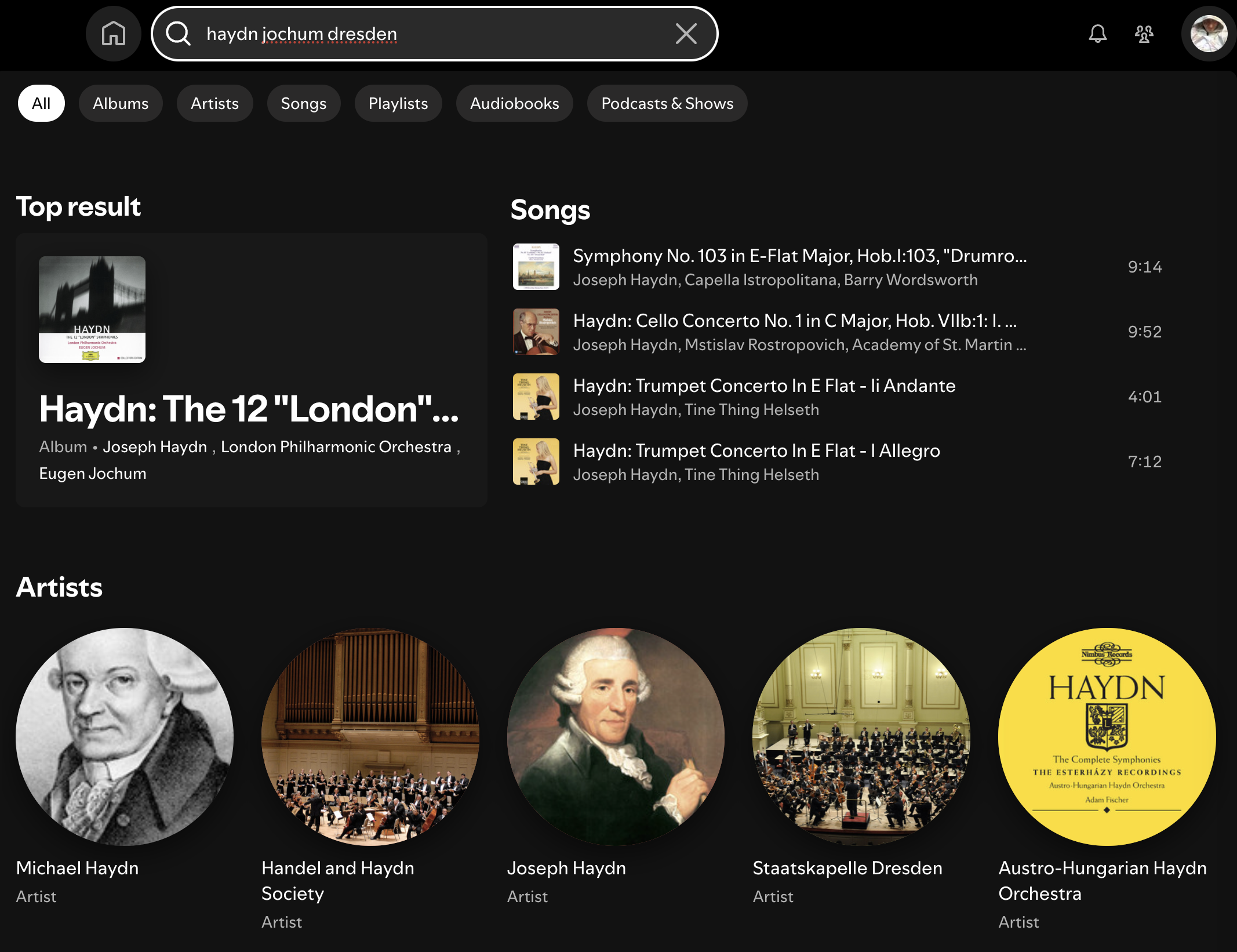
The "Top result" is Haydn and Jochum, but not Dresden. The "Songs" are Haydn without Jochum or Dresden, and the Artists start with, obtusely, Jospeh Haydn's less-famous younger brother. And you see that 3 of 5 classical titles here get truncated before the most important part, despite word-wrap technology having existed for only slightly less of history than Haydn's symphonies. The page does scroll, but that's only helpful if you're looking for "Haydn Radio", which you shouldn't be, or a hot podcast about Haydn, which may or may not exist but I don't care which.
After trying a few other search variations, I was almost ready to conclude that the Haydn recordings in question were hard to find because they weren't actually on Spotify, but finally I looked them up elsewhere, and then I was able to find them on Spotify after all. Part of the problem is that album credits are usually less complete than track credits. This is an industry metadata issue, not a Spotify-specific problem, and there's no reason you should have to care about that difference any more than the Haydns do, but it means none of us are ever going to find the two albums of Haydn / Jochum / Dresden music on Spotify, because they are credited only to Haydn, whose artist page has 1465 releases.
Apple Music, of course, has a whole dedicated classical-music sub-service called Idagio, so we might expect the difference to be like night and day, and indeed it is in terms of color palettes:
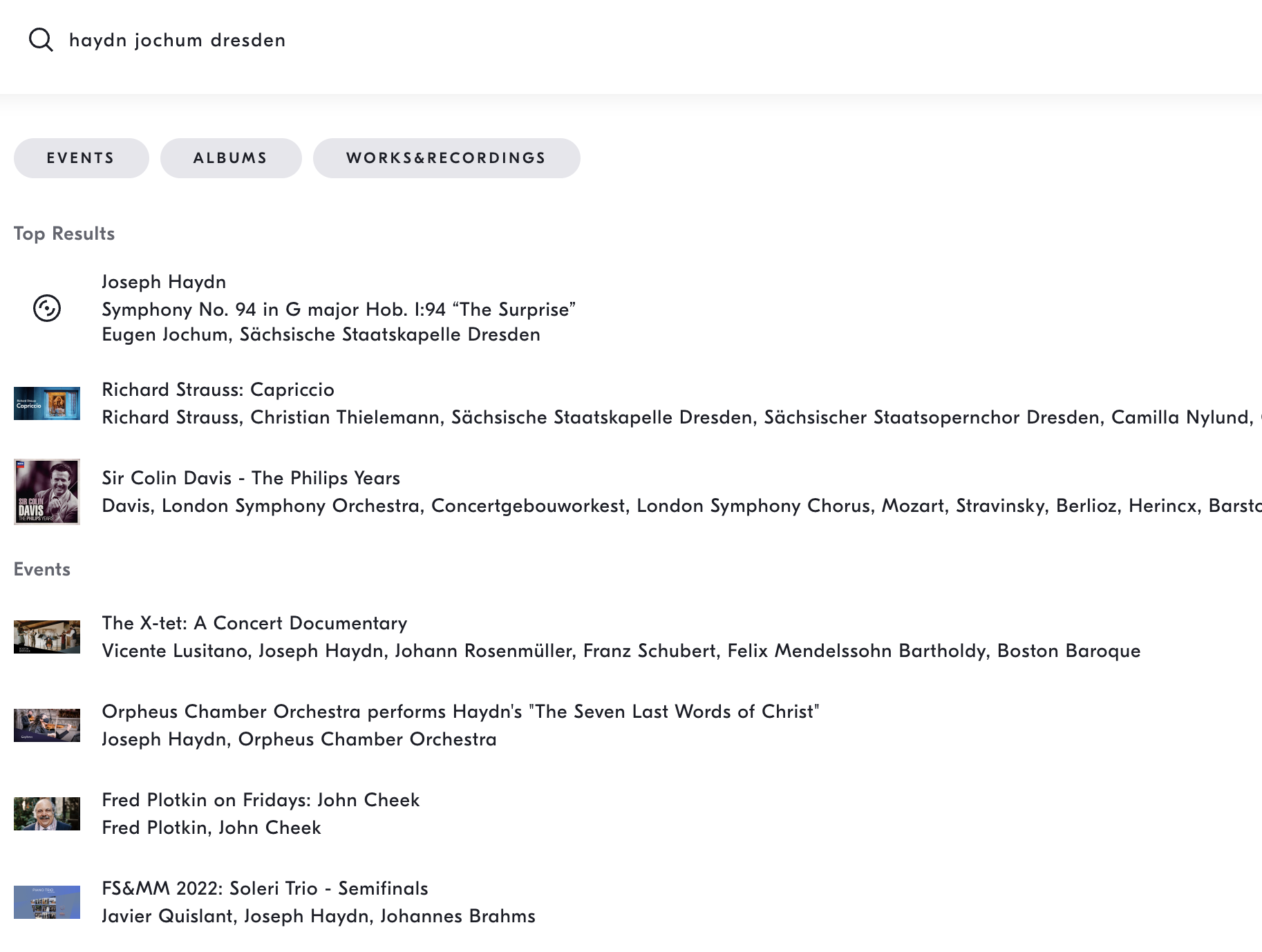
Results-wise, however, a "Haydn Jochum Dresden" search here still finds only one of the four pieces it should, and a lot of irrelevance instead of the other three, and really we shouldn't need a whole bespoke streaming service just to upgrade our search success from 0/4 to 1/4.
We only need a little extra syntax to say what we want, and a tiny bit of extra post-processing to get it. Both of which I've now added to my existing research tools on everynoise.com.
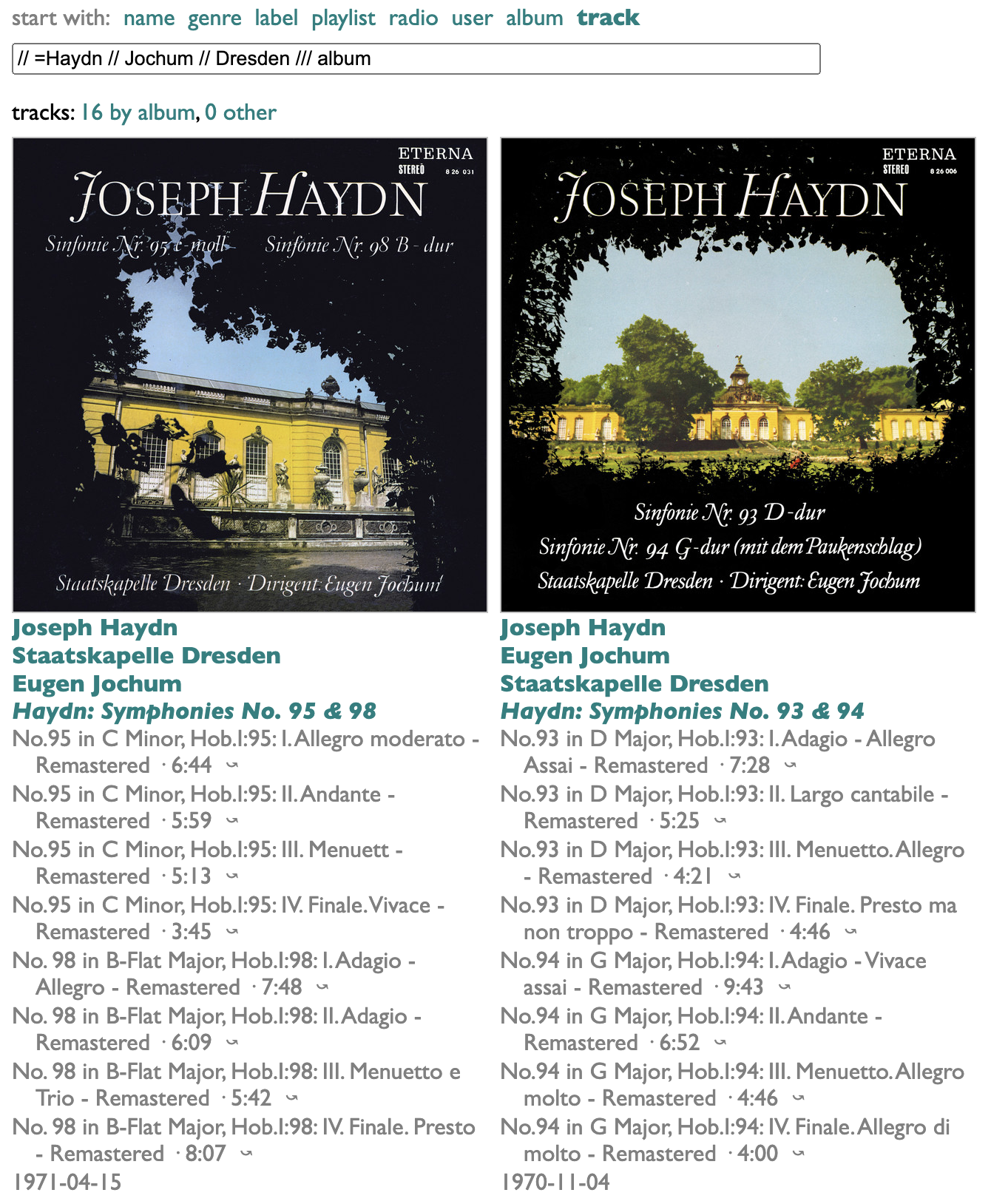
The main addition is that you can append // to your track-name search (which here is blank because we're trying to find these without remembering what they're called) to filter by artist. Doing =Haydn looks for "Haydn" only in the name of the first artist, which in the case of classical releases is always the composer. +Dresden would specify matching "Dresden" in an artist name other than the first, but there's nobody named "Haydn Dresden" yet, so I didn't bother. Partial matches are fine in all cases, so we don't need to know whether Haydn is listed as Joseph or Franz Joseph, nor how to spell Eugen or Staatskapelle.
The extra bonus feature I added is the /// album bit, which says to find only tracks that appear on proper albums (as opposed to dodgy mood compilations), and then to group and sort the results by those albums. I also took the time to factor common prefixes out of the titles, which spares us only the repeated word "Symphony" in the case of the two omnibus Haydn packages above, but produces much more readable track lists in some more-common cases. Take, e.g., this:
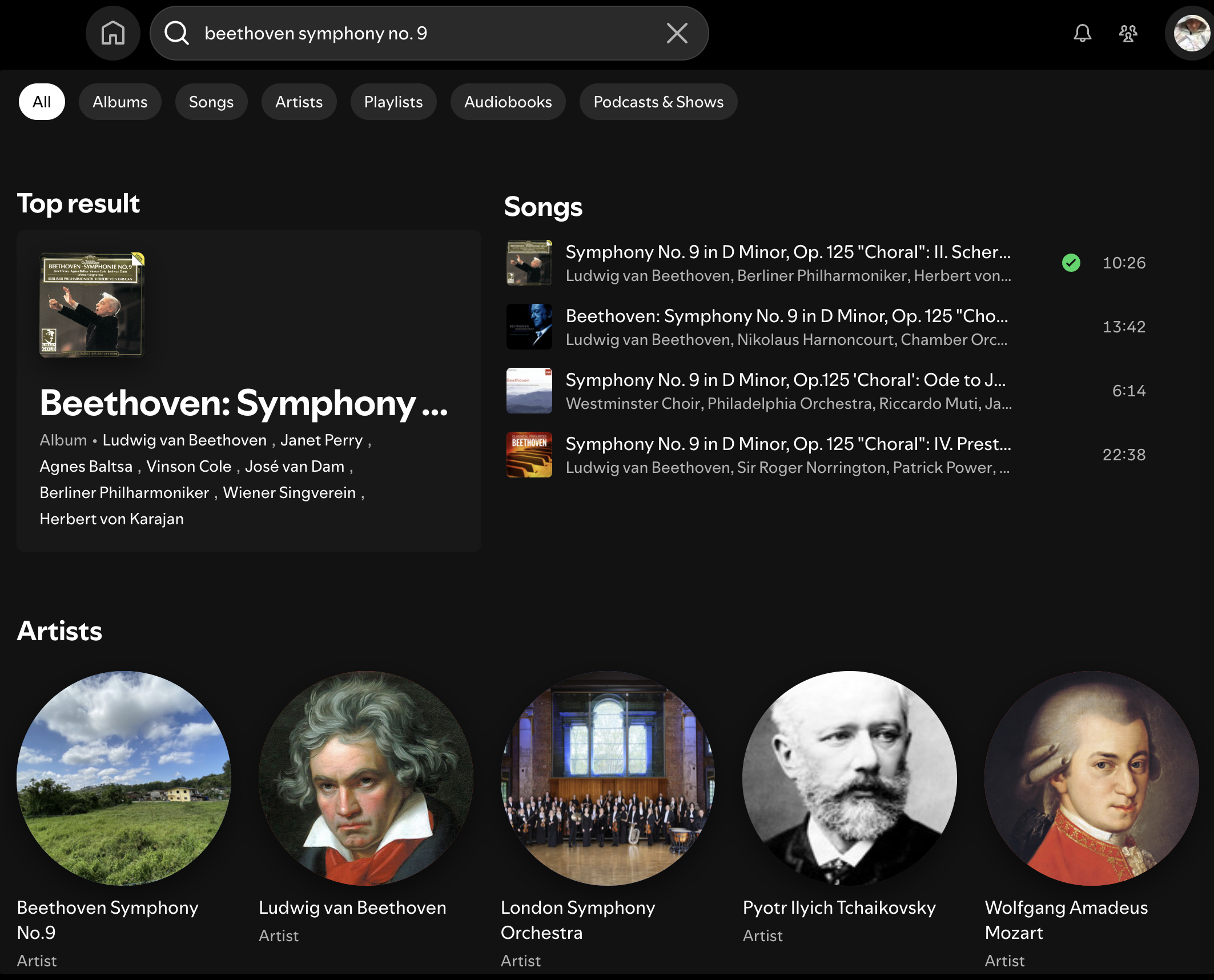
Ah yes, Beethoven's immortal symphony "...", popularly known as "Ellipsica". All eight lines in the "Songs" section are truncated, and trust me that you don't need to know what the "artist" called "Beethoven Symphony No. 9" sounds like, unless you are currently less than six months old and suffering from colic. Why are there spaces before the commas in the "Top result" artist list, and why does every artist in the boldly labeled Artists section say "Artist" again under it?
With a little care, filtering and sorting, we can get this:
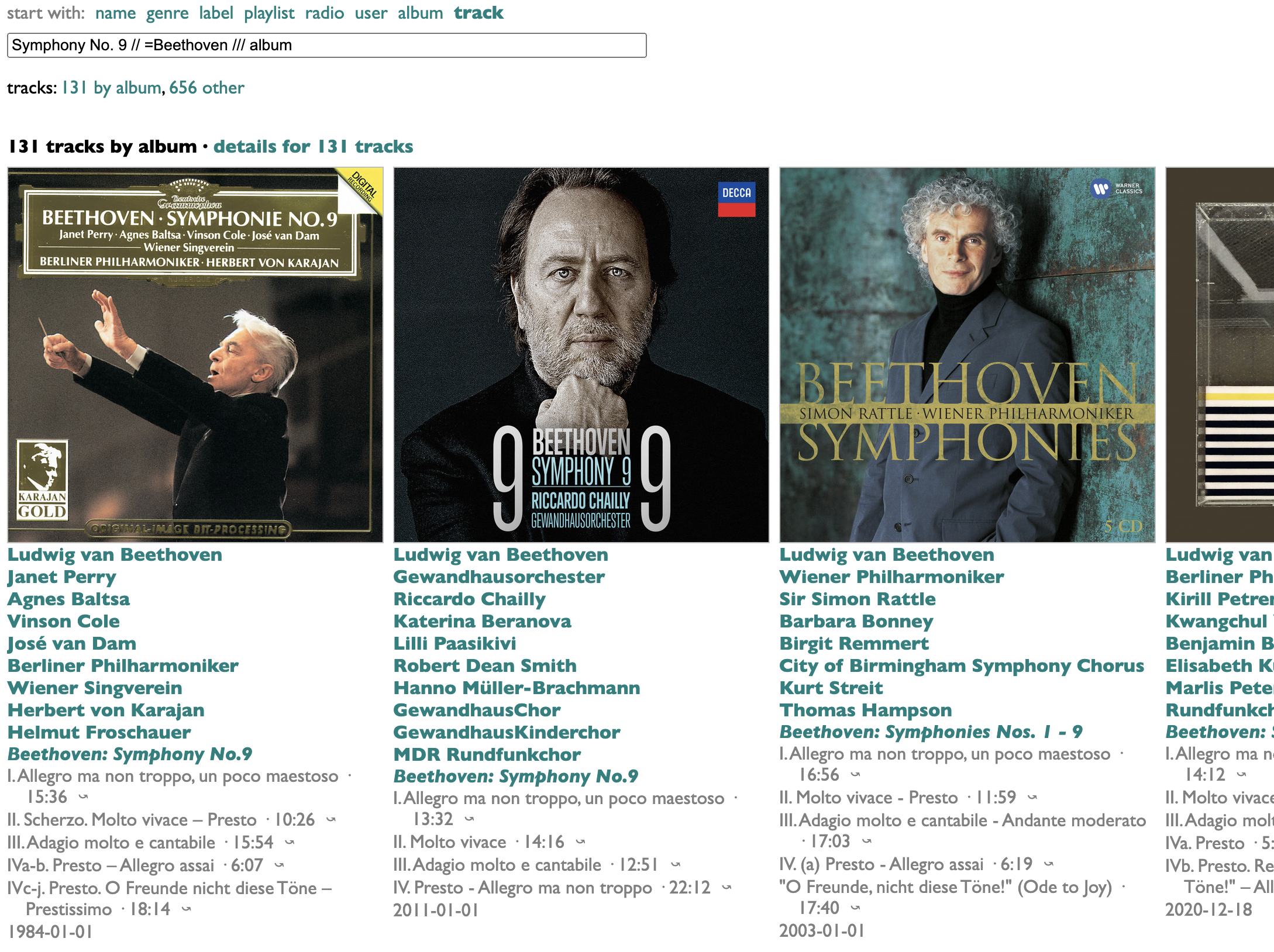
Real albums. Readable movements. No recommendations, no moods except for your own.
And none of this was even specific to classical music. You can use these same tools to find that Bowie/Jagger song about dancing:
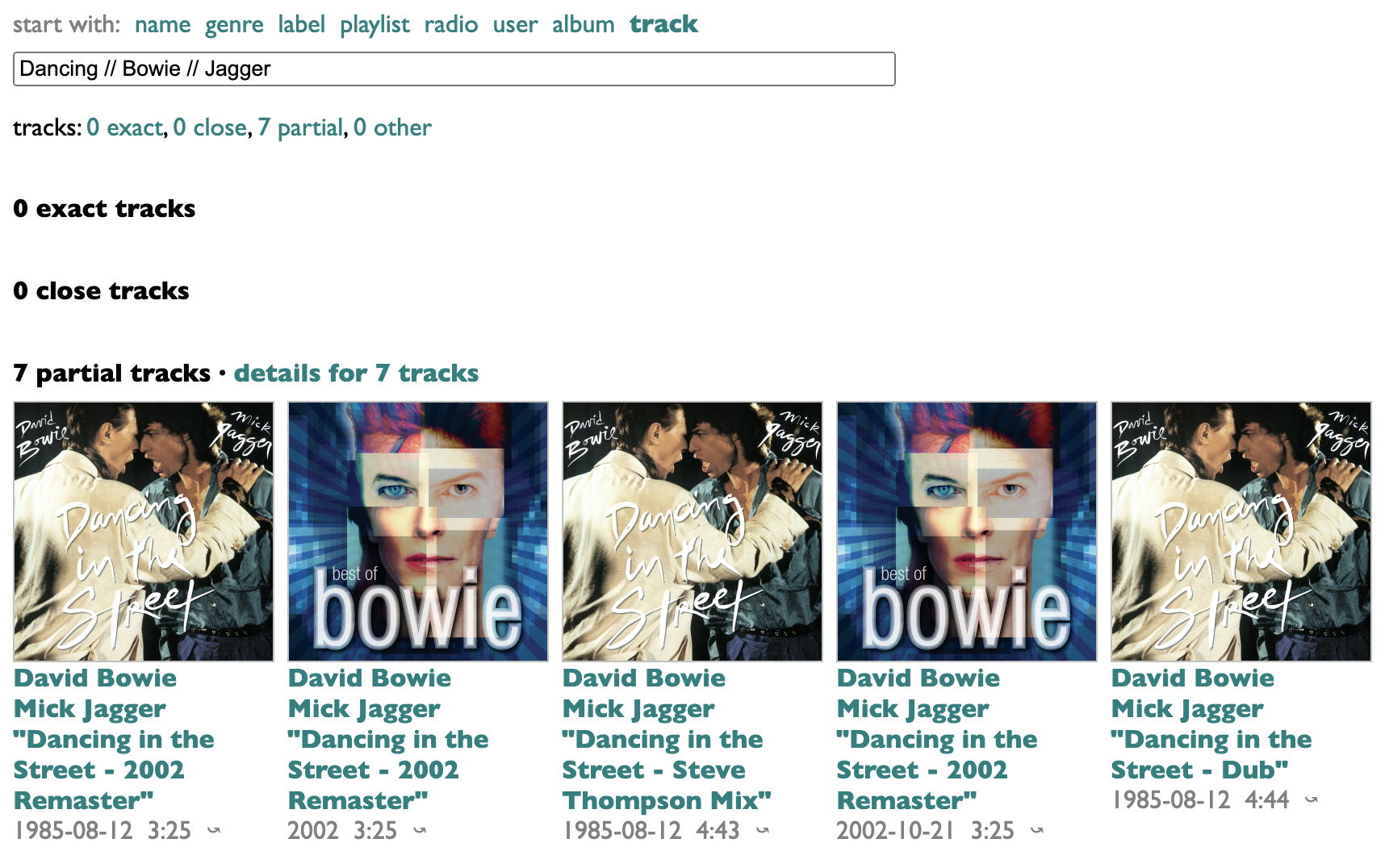
To be fair, you could find that, plus some bonus Björk, with normal searching:
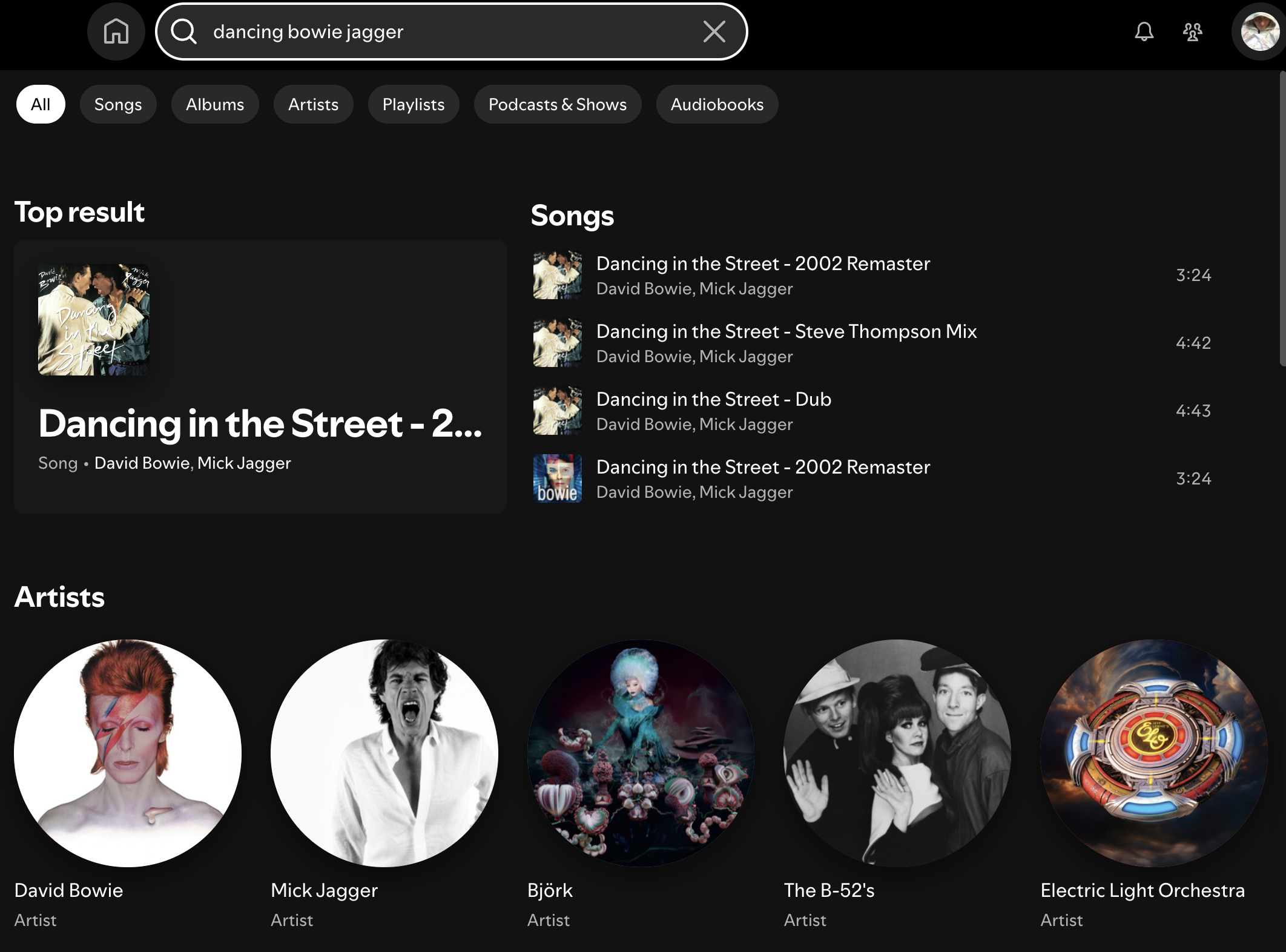
But my version has a wildcard filter so we can find all of Bowie's collaborations:
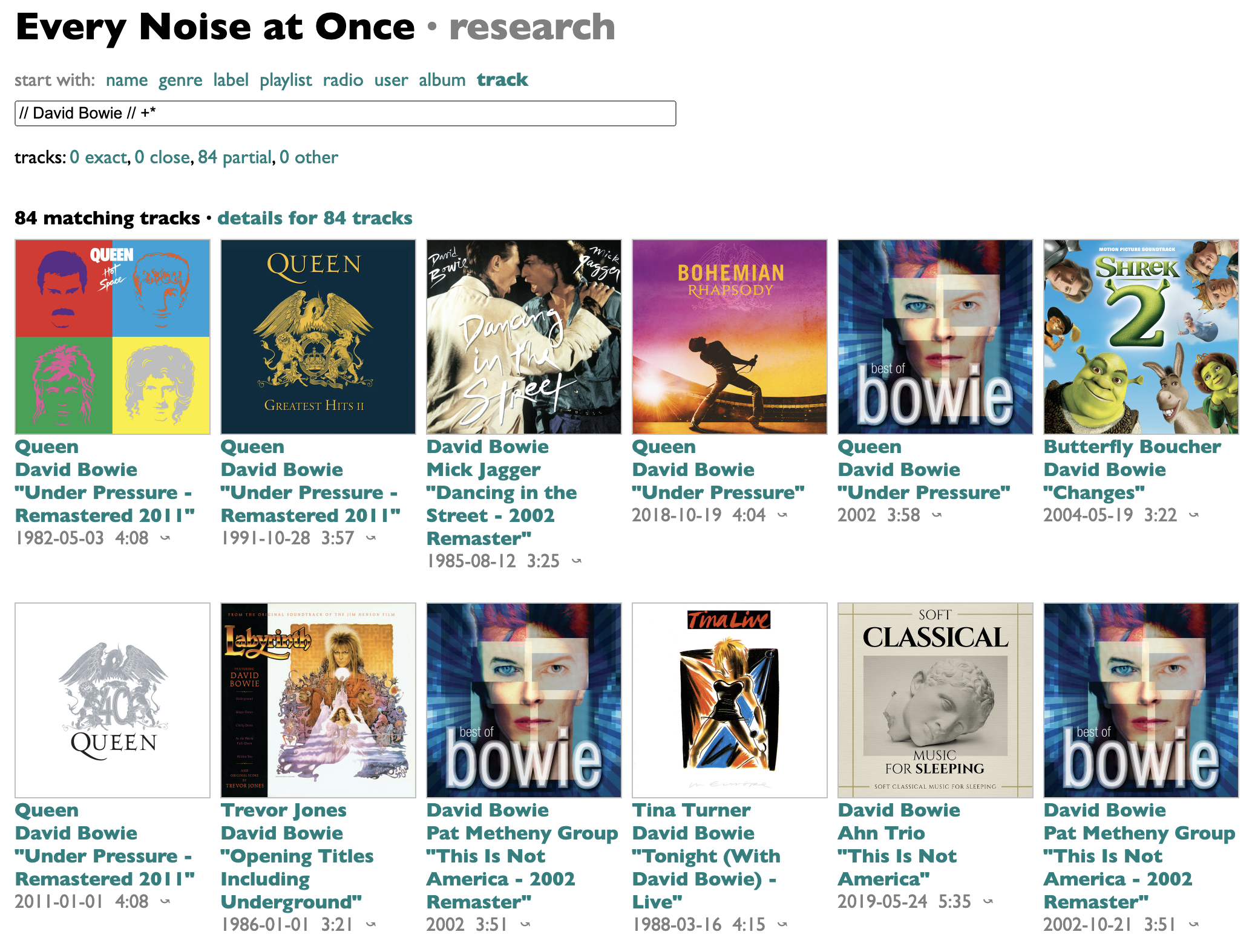
And even deduplicate them by song:
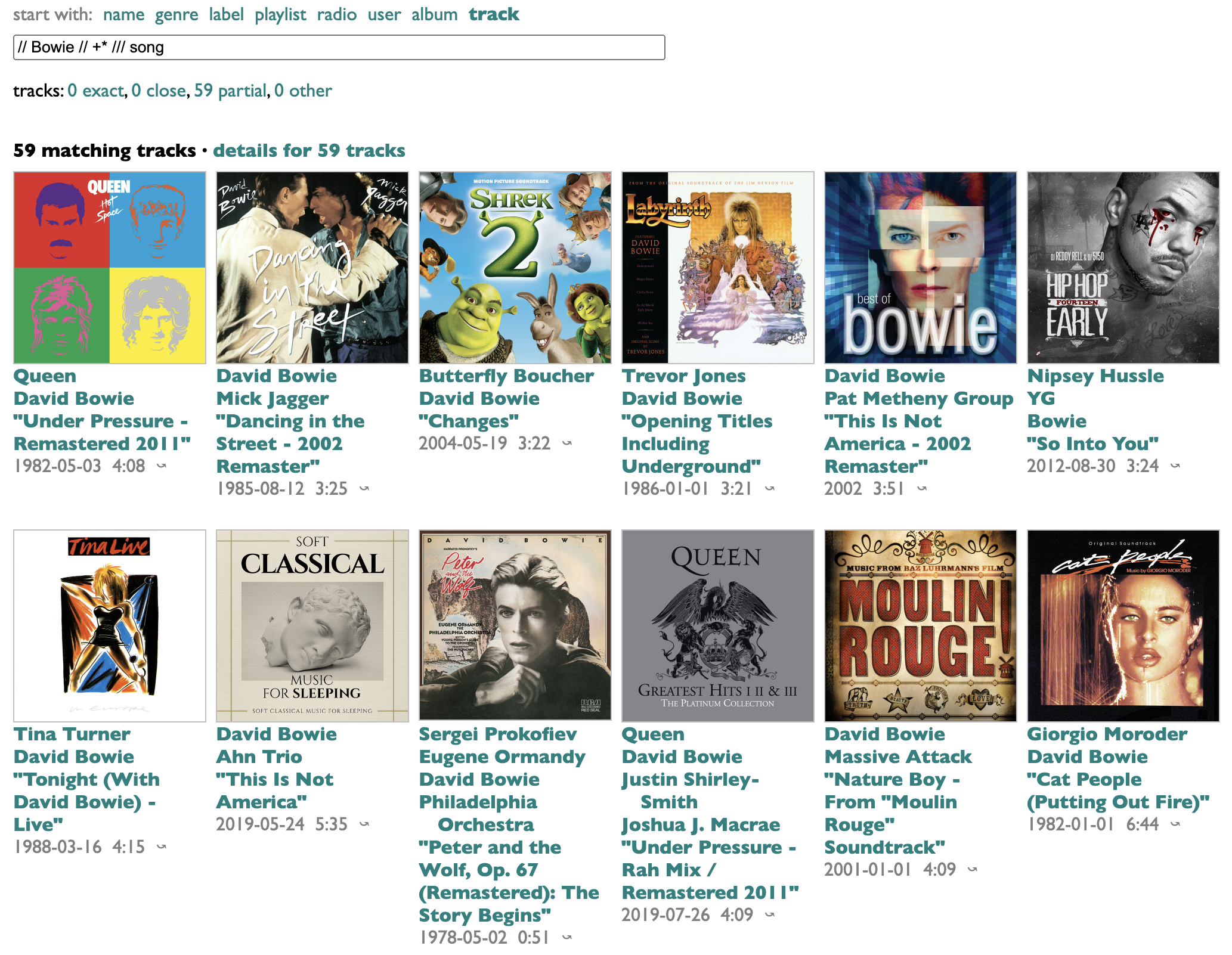
Or all the Ghetts tracks with no guests:
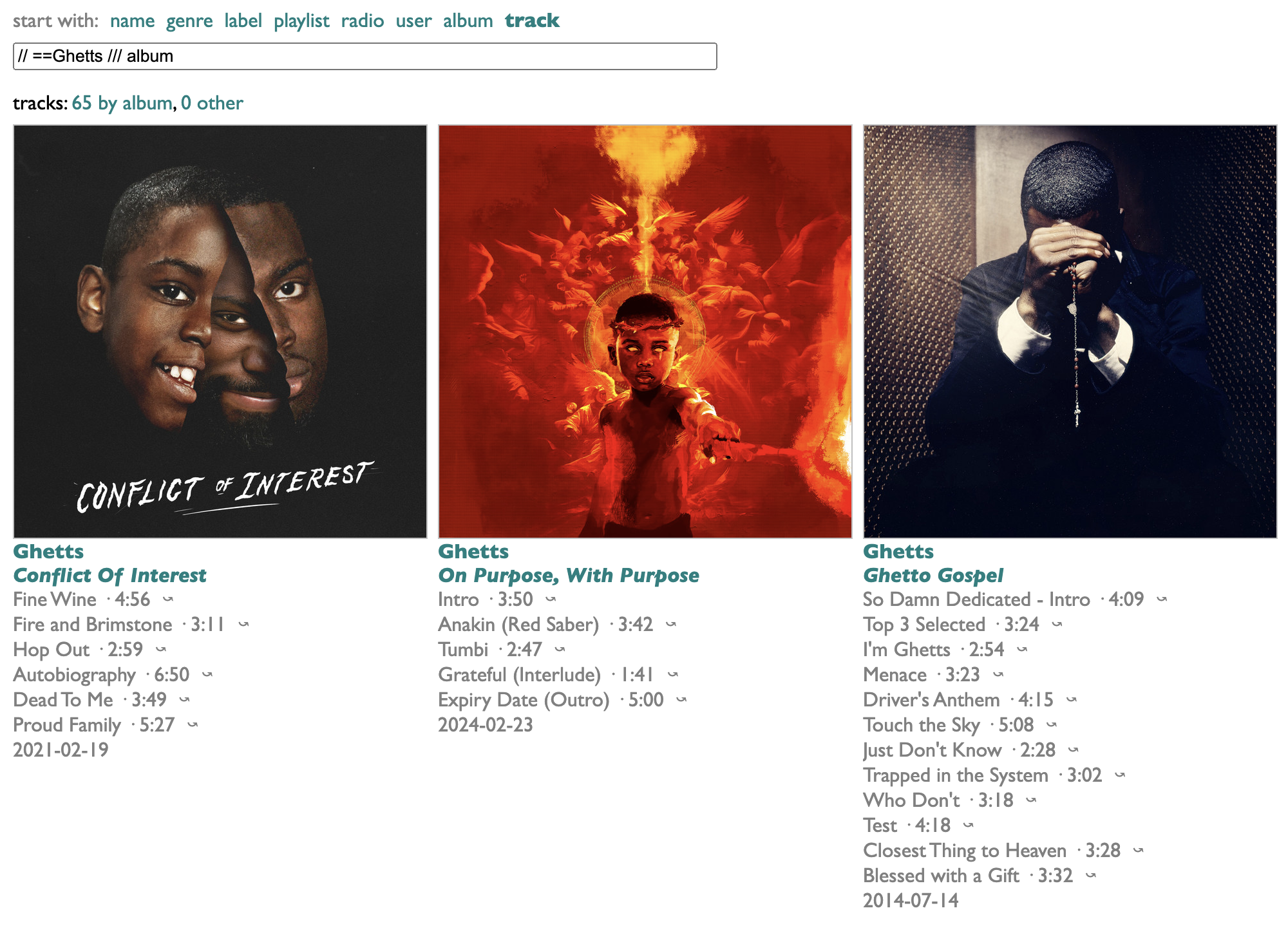
Or all the non-CHVRCHES songs featuring CHVRCHES:
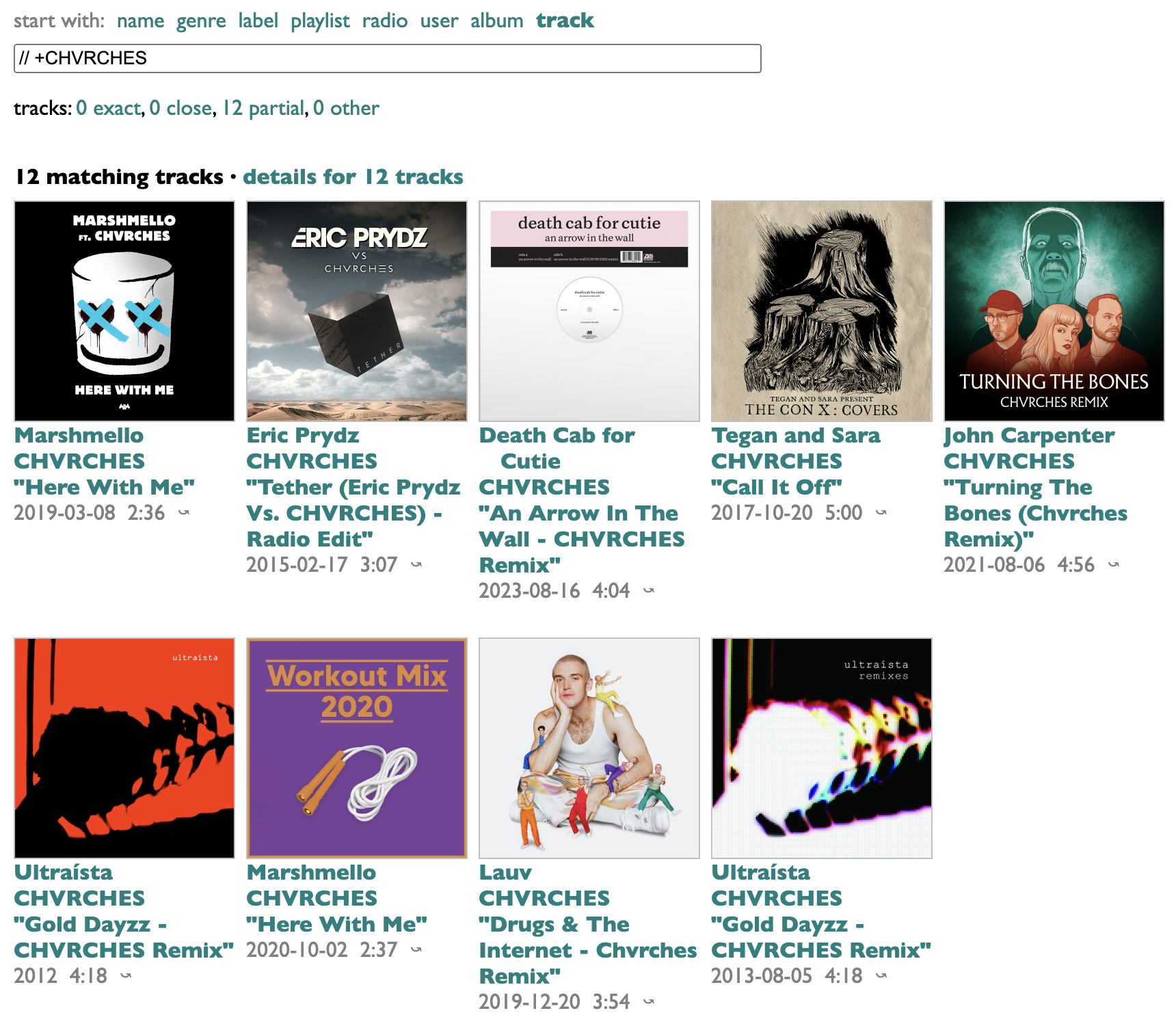
It's not complicated. We don't need AI for this.
(Which is good, because the AI is, maybe, not quite ready...)
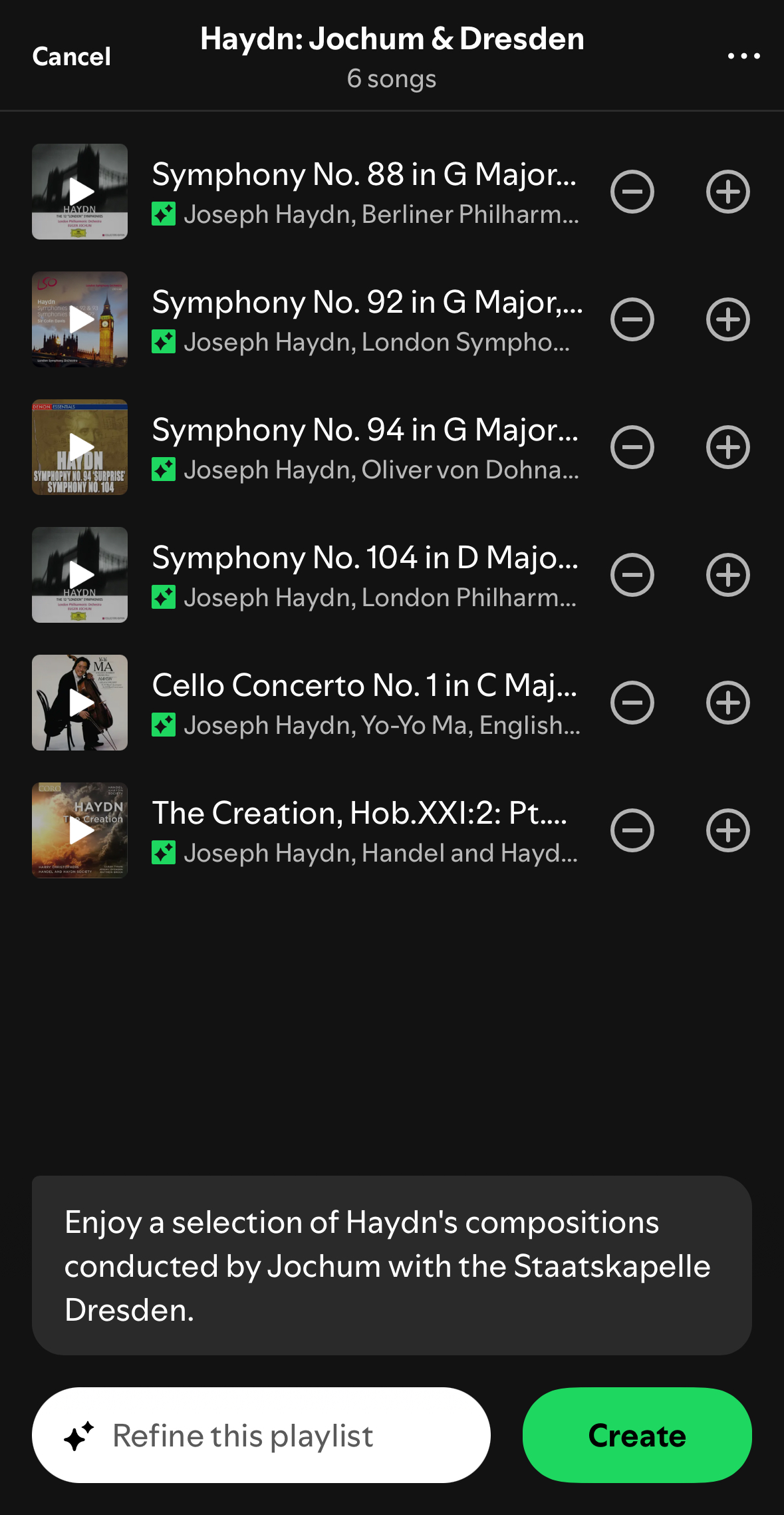
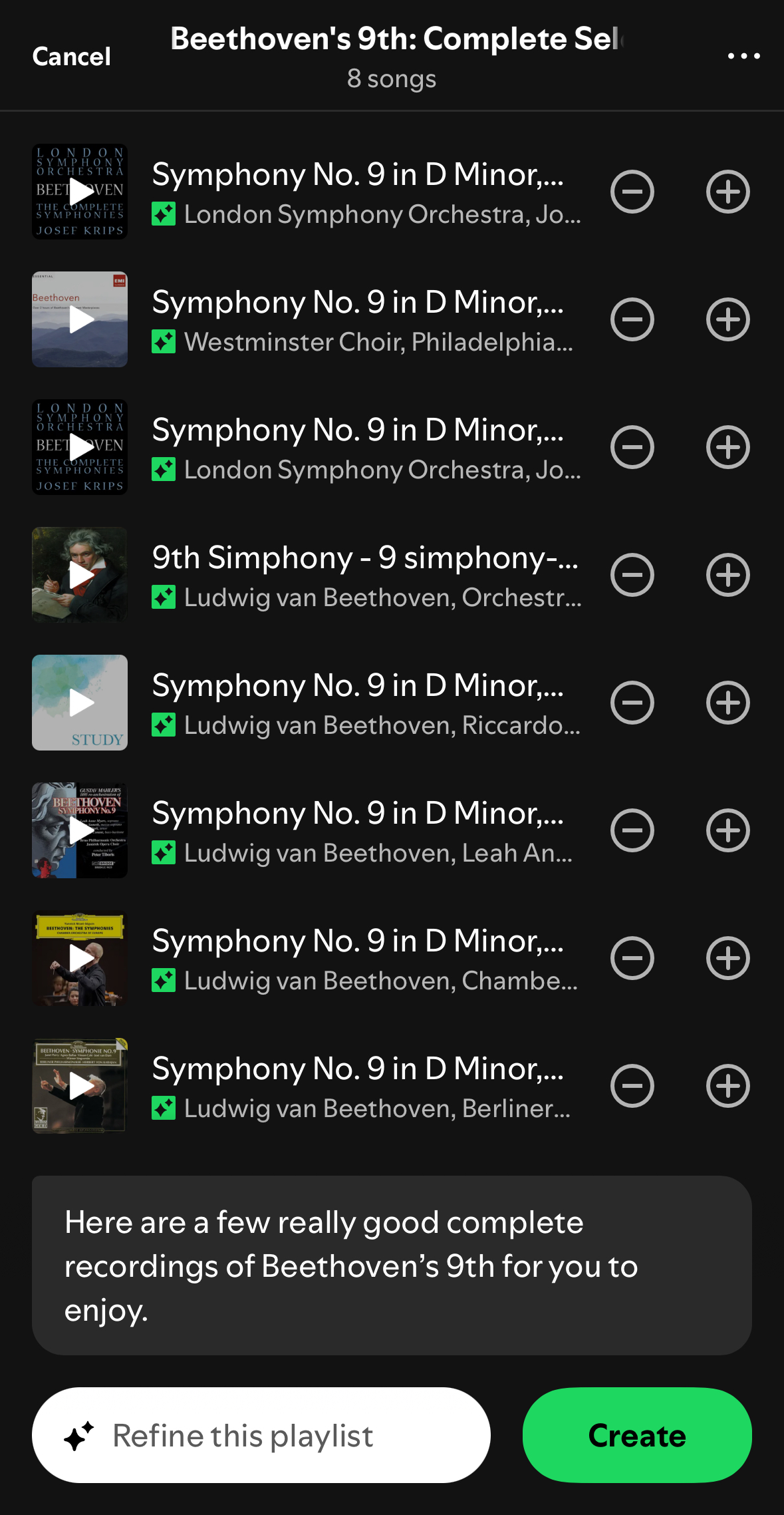
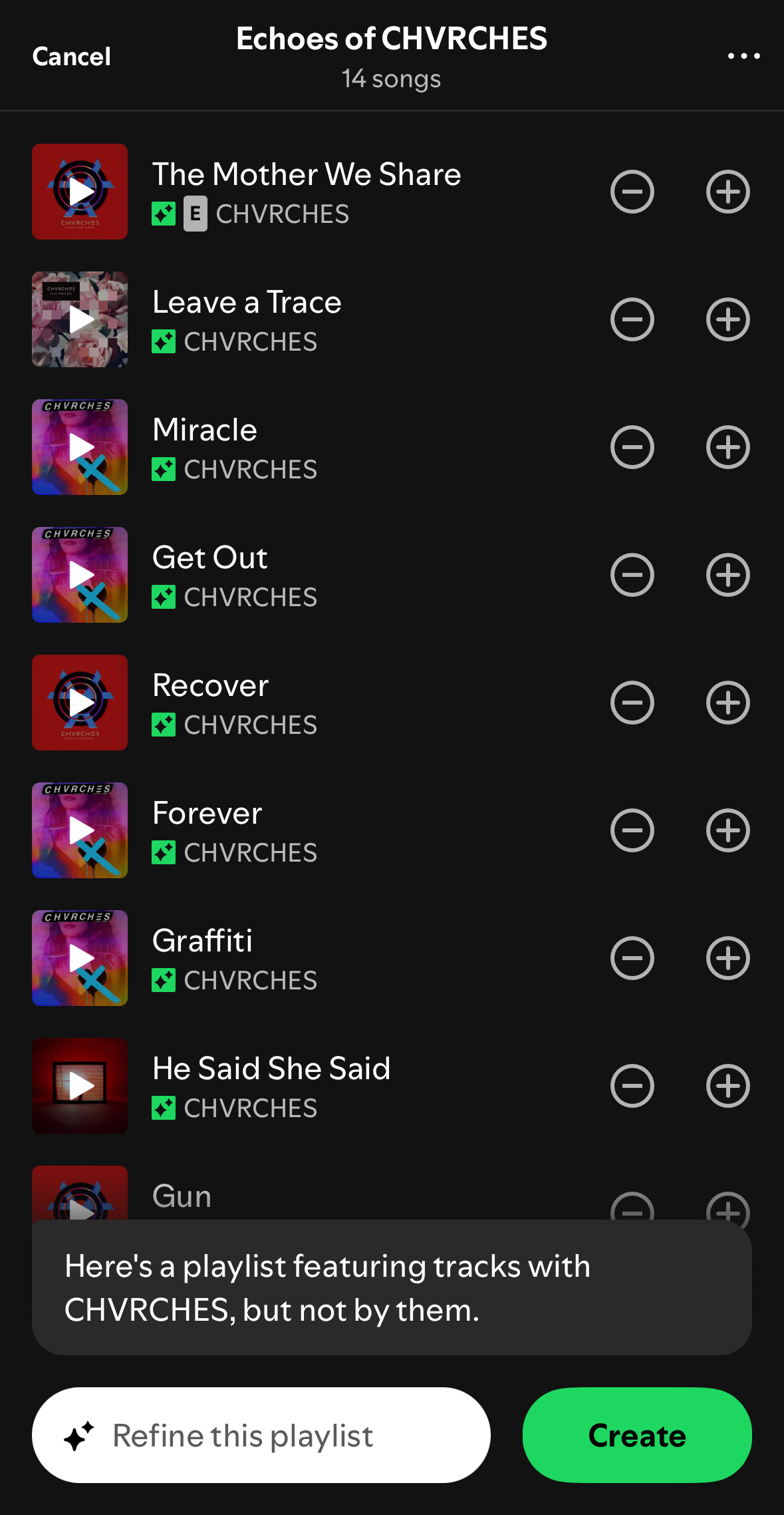
If there are tools that are supposed to help you find stuff, but don't, that's less great. I started thinking about this again after seeing a plaintive Reddit post from somebody trying, unsuccessfully, to find a classical recording composed by (Joseph) Haydn, conducted by (Eugen) Jochum and performed by (Staatskapelle) Dresden. They made it worse for themselves by trying to do it in the Spotify mobile app, but it's not a lot better in the desktop version:

The "Top result" is Haydn and Jochum, but not Dresden. The "Songs" are Haydn without Jochum or Dresden, and the Artists start with, obtusely, Jospeh Haydn's less-famous younger brother. And you see that 3 of 5 classical titles here get truncated before the most important part, despite word-wrap technology having existed for only slightly less of history than Haydn's symphonies. The page does scroll, but that's only helpful if you're looking for "Haydn Radio", which you shouldn't be, or a hot podcast about Haydn, which may or may not exist but I don't care which.
After trying a few other search variations, I was almost ready to conclude that the Haydn recordings in question were hard to find because they weren't actually on Spotify, but finally I looked them up elsewhere, and then I was able to find them on Spotify after all. Part of the problem is that album credits are usually less complete than track credits. This is an industry metadata issue, not a Spotify-specific problem, and there's no reason you should have to care about that difference any more than the Haydns do, but it means none of us are ever going to find the two albums of Haydn / Jochum / Dresden music on Spotify, because they are credited only to Haydn, whose artist page has 1465 releases.
Apple Music, of course, has a whole dedicated classical-music sub-service called Idagio, so we might expect the difference to be like night and day, and indeed it is in terms of color palettes:

Results-wise, however, a "Haydn Jochum Dresden" search here still finds only one of the four pieces it should, and a lot of irrelevance instead of the other three, and really we shouldn't need a whole bespoke streaming service just to upgrade our search success from 0/4 to 1/4.
We only need a little extra syntax to say what we want, and a tiny bit of extra post-processing to get it. Both of which I've now added to my existing research tools on everynoise.com.

The main addition is that you can append // to your track-name search (which here is blank because we're trying to find these without remembering what they're called) to filter by artist. Doing =Haydn looks for "Haydn" only in the name of the first artist, which in the case of classical releases is always the composer. +Dresden would specify matching "Dresden" in an artist name other than the first, but there's nobody named "Haydn Dresden" yet, so I didn't bother. Partial matches are fine in all cases, so we don't need to know whether Haydn is listed as Joseph or Franz Joseph, nor how to spell Eugen or Staatskapelle.
The extra bonus feature I added is the /// album bit, which says to find only tracks that appear on proper albums (as opposed to dodgy mood compilations), and then to group and sort the results by those albums. I also took the time to factor common prefixes out of the titles, which spares us only the repeated word "Symphony" in the case of the two omnibus Haydn packages above, but produces much more readable track lists in some more-common cases. Take, e.g., this:

Ah yes, Beethoven's immortal symphony "...", popularly known as "Ellipsica". All eight lines in the "Songs" section are truncated, and trust me that you don't need to know what the "artist" called "Beethoven Symphony No. 9" sounds like, unless you are currently less than six months old and suffering from colic. Why are there spaces before the commas in the "Top result" artist list, and why does every artist in the boldly labeled Artists section say "Artist" again under it?
With a little care, filtering and sorting, we can get this:

Real albums. Readable movements. No recommendations, no moods except for your own.
And none of this was even specific to classical music. You can use these same tools to find that Bowie/Jagger song about dancing:

To be fair, you could find that, plus some bonus Björk, with normal searching:

But my version has a wildcard filter so we can find all of Bowie's collaborations:

And even deduplicate them by song:

Or all the Ghetts tracks with no guests:

Or all the non-CHVRCHES songs featuring CHVRCHES:

It's not complicated. We don't need AI for this.
(Which is good, because the AI is, maybe, not quite ready...)



